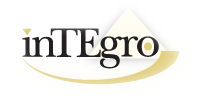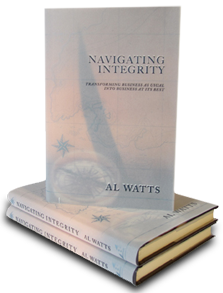My wife and I recently had the pleasure of visiting our daughter Alison in China, where she has been living and working for eight months. There is enough about that adventure to fill a few volumes – most of it very positive. One interesting experience involved our visit to an “authentic jade factory” after touring the Great Wall. There were signals, including “certificates of authenticity,” to help us feel confident about purchasing two jade bracelets – one for Carley and one for her sister back home. Later that day I fastened Carley’s bracelet to her wrist securely for a walk through Bejing’s “Night Market.” About thirty minutes into the walk we heard a “purclunk;” Carley’s “authentic” jade bracelet laid in pieces on the sidewalk. (Could experiences like these have led to the expression: “jaded outlook?”)
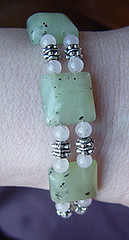 Eager to capture some return on my investment, I wondered what lessons could be learned from the “jade scam” as we’ve come to call it. First, I concluded that as with most things, it’s just a matter of time before we can distinguish what’s authentic from what isn’t. In the case of our “jade” bracelets it was just a few hours (but long enough that we couldn’t do much about it.) In the case of the recent mortgage crisis, the subsequent economic meltdown and the organizations that spawned them, it took a few years before we realized that all was not what we were led to believe. (And unfortunately, by the time we got wise, also too late to do much about it.) Likewise with leaders of organizations like Enron, WorldCom, Fannie Mae who were once hailed as paragons of shrewd, effective leadership; most of them are still doing time in the penitentiary now, and their organizations are non-existent. A serious lack of authenticity, in organizations or leaders, is not sustainable.
Eager to capture some return on my investment, I wondered what lessons could be learned from the “jade scam” as we’ve come to call it. First, I concluded that as with most things, it’s just a matter of time before we can distinguish what’s authentic from what isn’t. In the case of our “jade” bracelets it was just a few hours (but long enough that we couldn’t do much about it.) In the case of the recent mortgage crisis, the subsequent economic meltdown and the organizations that spawned them, it took a few years before we realized that all was not what we were led to believe. (And unfortunately, by the time we got wise, also too late to do much about it.) Likewise with leaders of organizations like Enron, WorldCom, Fannie Mae who were once hailed as paragons of shrewd, effective leadership; most of them are still doing time in the penitentiary now, and their organizations are non-existent. A serious lack of authenticity, in organizations or leaders, is not sustainable.
There are usually signs that signal a potential lack of authenticity; 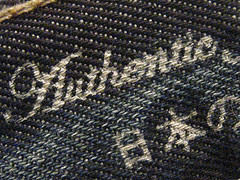 unfortunately, for various reasons, we overlook them or choose not to believe them. (One of the best books on that subject is Denial, by Richard Tedlow.) We want to trust our boss; we want to work for a great organization; we want a great deal. Authentic leadership means that we not only pass the “trueness” test – that we are who or what we say we are; it also means that we pay attention so we can discern what’s true. As Max DePree, retired CEO of Hermann Miller, reminded us: “A leader’s first job is to define reality.” If we desire authentic products, authentic relationships, authentic leaders and authentic experiences, then we bear some of the responsibility for finding them by searching for what’s true, in the same way that “a populace deserves the leaders it elects.”
unfortunately, for various reasons, we overlook them or choose not to believe them. (One of the best books on that subject is Denial, by Richard Tedlow.) We want to trust our boss; we want to work for a great organization; we want a great deal. Authentic leadership means that we not only pass the “trueness” test – that we are who or what we say we are; it also means that we pay attention so we can discern what’s true. As Max DePree, retired CEO of Hermann Miller, reminded us: “A leader’s first job is to define reality.” If we desire authentic products, authentic relationships, authentic leaders and authentic experiences, then we bear some of the responsibility for finding them by searching for what’s true, in the same way that “a populace deserves the leaders it elects.”
Since “the jade scam” occurred early in our trip, it of course colored our perspective for the balance of our time in China. Seeking to avoid a “fool me once, shame on you; fool me twice, shame on me” experience, we didn’t even consider any future jade purchases while there. Right or wrong, we definitely had our guards up for the balance of our stay. Of course we experience the same with leaders and organizations that are less than authentic; trust is fragile and easy to lose, but very hard to regain. The impact of inauthentic experiences is magnified when they occur early in a relationship since no or little “integrity capital” has been built up. Think of those implications relative to young adults’ first work experiences and how they might color (or “jade”) trust levels with future employers.
Our overall experience in China was amazingly positive. The country and 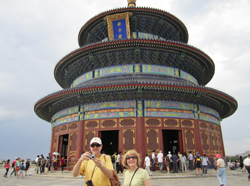 its people exhibit enormous resourcefulness, discipline, industriousness and pride in their culture. We experienced, as our daughter had already reported, less anxiety about outright theft and personal safety (with the exception of traffic and drivers!) than in most large U.S. cities. Our monetary loss from the jade incident wasn’t that great, and it yielded some important lessons plus something to share in my next blog!
its people exhibit enormous resourcefulness, discipline, industriousness and pride in their culture. We experienced, as our daughter had already reported, less anxiety about outright theft and personal safety (with the exception of traffic and drivers!) than in most large U.S. cities. Our monetary loss from the jade incident wasn’t that great, and it yielded some important lessons plus something to share in my next blog!
“Truth is what stands the test of experience.”
– Albert Einstein
“Trust is the great simplifier. If people in business told the truth, 80 to 90 percent of their problems would disappear.”
– Will Schutz
In what ways might we be more true to who or what we say we are?
In what ways might we get better at distinguishing who or what is authentic from those that aren’t?
If we have lost anyone’s trust or confidence, what concrete steps can we take to regain it?

